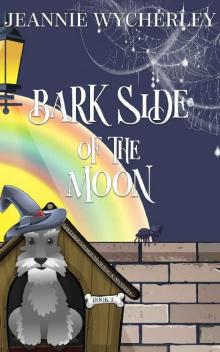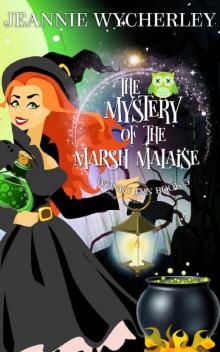- Home
- Jeannie Wycherley
Midnight Garden (The Extra Ordinary World Novella Series Book 1)
Midnight Garden (The Extra Ordinary World Novella Series Book 1) Read online
Copyright © 2019 Jeannie Wycherley
Bark at the Moon Books
All rights reserved
* * *
Publishers note: This is a work of fiction. All characters, names, places and incidents are either products of the author’s imagination or are used fictitiously and for effect or are used with permission. Any other resemblance to actual persons, either living or dead, is entirely coincidental.
* * *
No part of this book may be reproduced, distributed or transmitted in any form or by any means, including photocopying, recording, or other electronic or mechanical methods, or by any information storage and retrieval system without the prior written permission of the publisher, except in the case of very brief quotations embodied in critical reviews and certain other non-commercial uses permitted by copyright law.
* * *
Sign up for Jeannie’s newsletter: http://eepurl.com/cN3Q6L
* * *
Midnight Garden was edited by Anna Bloom @ The Indie Hub
* * *
Proofreading by Nikki Groom @ The Indie Hub
Cover Design: Silvana G. Sánchez © Selfpub Designs
selfpubdesigns.com
Formatting by Tammy
Contents
Author’s Note
Chapter 1
Chapter 2
Chapter 3
Chapter 4
Chapter 5
Chapter 6
Chapter 7
Chapter 8
Chapter 9
Chapter 10
Chapter 11
Chapter 12
Chapter 13
Chapter 14
Chapter 15
Chapter 16
Please?
More Dark Fantasy from Jeannie Wycherley
Beyond the Veil
The Wonky Inn Books
The Wonky Inn Series
Also by Jeannie Wycherley
Coming Summer 2019
Author’s Note
This book is set in the West Country in the United Kingdom.
* * *
It uses British English spellings, punctuation, idioms and vernacular.
It was everything I remembered… and yet nothing like I remembered.
Standing in the subdued arc of yellow light from the streetlamp, I paid the taxi driver and waited for him to tender the few coppers in change he owed me. I turned to stare at the front of the house while he pulled my bags from the boot of the car and deposited them on the damp kerb.
“Cheers love,” he offered, and I nodded absently with a half-hearted wave, lost in my memories.
The low iron gate stood open, although less as an invitation to enter and more through force of habit. It had dropped on its hinges and rusted into position years ago. Litter—the yellow and red cardboard from a fast food burger restaurant, and a number of plastic bottles—had amassed along the inside of the railings, as much a prisoner of this place as I had once been.
As I still was, in many ways.
The stone edifice of the external walls stretched up and away. The four-storey Georgian terrace started in the basement and towered high above. My mother and father had bought it when they first married, over fifty years before. I’d spent the first eighteen years of my life here, dreaming of escape.
So why the hell had I come back?
No choice, I reminded myself. No bloody choice.
It might have been a fine-looking house if someone somewhere along the line had been taking care of it. Nestled among a terrace of twelve, it had the saddest appearance of them all. Many of its neighbours had been gentrified, with fresh paint jobs and double glazing. I could tell that the house directly next door had recently been converted from a single-family home into flats or maisonettes by the sheer number of bell buttons by the door. A sure-fire way to make money in this day and age, I supposed.
My mother had languished here far longer than she should have done. It would have made sense for her to sell this house decades ago and move to a small cottage somewhere by the coast. She’d have made enough through the sale to live in comfort. Instead, here she was, seeing out her days in some kind of enforced genteel poverty, or whatever the twenty-first century equivalent of that was.
The windows of the house were dark, apart from a faint sickly-yellow glow from my mother’s bedroom above me, facing the street on the second floor.
She would be asleep by now, or more than likely in some drug-filled pain-relieving stupor. But given she was expecting me, she might have left the hall light on at least.
I hoisted my bags and struggled up the half dozen steps to the front door, only to dump them again in order to free my hands and let myself into my childhood home. I still had my own key despite the fact I hadn’t visited the house in well over a decade. How had I never mislaid it? I’d carelessly flung it in a kitchen drawer, but then occasionally while searching for something else it sporadically turned up. I’d assumed that if I ever had need of it, it would be lost without a trace in some Bermuda Triangle of the crap we hoard unnecessarily.
But no. Like a bad penny it had been exactly where I expected it to be when I needed it.
It turned stiffly in the lock and I couldn’t tell whether this was simply because the lock hadn’t been oiled in forever, or because the key sensed my own reluctance to re-enter an establishment I had tried so hard to run away from.
I pushed the door wide and slid my bags over the threshold, reaching—by virtue of muscle memory—for the hall light switch. The resulting dim glow illuminated a sight I remembered so well. Black and white tiled flooring, an ornate staircase curving away from me up to the next level. The door to the left opened into the large living room, while the door to the right had been a guest bedroom or a sometime-study back in my father’s day.
At the end of the entrance hall, you turned a sharp right and doubled back on yourself to descend on a narrower flight of stairs to the kitchen-come-diner and utility in the basement. I thought about reacquainting myself with the space we as a family had once inhabited the most. Deciding against it, I opted to head directly to my old bedroom instead.
I closed and locked the front door and abandoned the heavier of my bags before beginning the ascent of the main stairs. They creaked in all the old familiar places. Framed photos of grandparents long departed still displayed alongside cheap canvas art prints. They each occupied exactly the same place they always had. The walls were still beige, perhaps more yellowy than I remembered. There was nothing new here, nothing to surprise me. Nothing that told me than in the twelve years since I’d last set eyes on my mother by visiting her here, she had lived any kind of meaningful life without me.
I paused at my mother’s bedroom door, ears straining. I could imagine her on the other side of the door, lying in her marital bed and listening to me moving around. But I didn’t tap on the wood, or call out to her to tell her I’d arrived.
Let her sleep, if that’s what she was doing. Tomorrow would be soon enough for us to stage our reunion. I sincerely doubted it would be joyful.
I continued up to the top floor where two smaller rooms were carved into the attic space. Mine, above my mothers’ and facing out onto the street, with a good view of the house across the way. My brother Ian’s on the opposite side of the small landing. His window overlooked our garden.
The garden my mother had paved after Ian had died, as though she and I, the survivors of the wreckage of our family, should never enjoy green space or flowers again.
I cast a quick glance at his closed door, the way I had a million times before. I c
ould envision him in there. Imagination is a powerful thing. Sometimes when a door is closed, the missing person can still inhabit the world. With the door closed, he remained alive, still playing with his Lego, or reading, sprawled untidily across his bed the way he used to. I resisted the urge to sneak a peek. I knew that if I cracked the door a tiny amount, I would let the breath out of the room, and he would die all over again.
I always kept his door firmly closed.
Instead, I opened my own bedroom door. This was something of an anti-climax. Yes it had remained the same—in so many ways—a snapshot in time from my late teenage years, but on previous visits I had sifted and sorted and expunged my old belongings. I’d already eliminated anything and everything that caused me to feel. I’d relegated my history to the bin.
Now I washed my hands and face and brushed my teeth in the tiny basin in the corner of the room, then undressed and lay beneath the ancient duvet that covered my narrow bed.
I’d rather have been anywhere else in the world than here, but for now there was no place else I could be.
“Good morning! You must be Lisa?”
“Yes.” I blinked in confusion, pulling the flaps of my dressing gown over my pyjamas. A woman in the pale blue uniform of a community nurse stood at the bottom of the stairs clutching a tray and smiling up at me.
Had she slept here overnight? “How did you get in?”
She nodded at the front door. “There’s a key safe outside. In case of emergencies. And it means that your mother’s carers can get in and out without disturbing anyone.” The woman was far too chirpy for the time of day. “I’m Cathy Meadows. I see your Mum most days, Monday to Friday.”
Of course. How else would my mother have coped here in this house alone?
“Shouldn’t she be in a home?” I asked. It sounded cold. Of course my mother would want to die at home. She’d obviously refuse to budge if anyone asked her to. That was so like her.
Cathy’s smile faltered momentarily in the face of my hostility. She shrugged. It wasn’t for her to say where my mother should be. Not her decision. I understood that.
“The kettle’s warm if you’d like tea.” Cathy made room so I could pass her.
“Thanks,” I said, making a vain attempt to sound a little friendlier. I noted the boiled eggs and soldiers on the tray along with tea in a cup and saucer. There would be some food in the kitchen then. That much was good news.
A little later Cathy joined me in the kitchen. “Your mother has been looking forward to seeing you.” I supped at my tea and regarded her over the remains of my poached egg on toast.
Could that be true? Did my mother really want to see me? It seemed unlikely.
“She talks about you,” Cathy continued as she ran hot water into the sink and began to wash up my mother’s breakfast plate.
The words hung in the air and I examined them. Not ‘all the time’ or even ‘sometimes’, just ‘she talks about you’. That made it hard for me gauge a suitable response. But I had to say something to fill the vast chasm of silence that suddenly existed in the room.
“I’ll pop in and see her in a bit.” When I’m dressed and I’ve put my face on and I feel up to it. When I can be bothered.
“She’ll like that.”
I didn’t care whether Cathy liked it or not. I didn’t care what anyone thought about my mother, or about my relationship with her, but I couldn’t say that out loud. Instead I simply pushed the corners of my mouth up into what could be construed as a smile and abandoned my dirty plate and cutlery on the table before sloping out of the kitchen.
It was bad enough being back here, let alone sharing the house with people I neither knew nor wanted to know.
It took me aback to see her.
Of course I’d known she was sick; the C word had been bandied about. But until you come face to face with what the disease actually looks like, I think you simply allow the mist of denial to close in, obscuring reality while you try to blithely ignore its existence.
She’d never been a large woman but now she’d been reduced to nothing more than a bag of bones. Stick thin, her skin hung from her. All the flesh which should have filled her body had disappeared. I cast my mind back remembering the last time I’d seen her. Back then she’d worn her glossy brown hair fairly short, always having favoured a Princess Diana hairstyle long after her icon’s demise. Now my mother’s hair was longer, caught at the neck with a pallid yellow ribbon that matched her skin tone, and as white as snow. White hair ran in her side of the family. It could look distinguished.
But my mother’s days of looking distinguished, or as glamorous as she once had, had long since disappeared. She was seventy-one. Only seventy-one some might say, but her days were numbered.
I tapped on the door, entering when I didn’t receive a response. She was sitting up in bed, maybe she’d been waiting for me, maybe, but she wasn’t alert. She slouched with her back against a mound of pillows and cushions, her eyes closed.
“Hello, Mother.” I shut the door behind me but didn’t move any further into the room.
Her eyes fluttered open. “Lisa?” she asked, her voice tremulous. She appeared confused. One hand fluttered lightly in my direction.
“Yes.”
“You’ve come home?” She blinked towards me, her mouth an ‘O’ of wonder. “I was hoping you would.”
Had she really been hoping? I found that hard to believe. The last time we’d spent any time together I’d ended up storming out of the house and refusing to come back. She’d never reached out to me in all the intervening time.
Twelve years.
“I received your letter.” Someone had written to me and enclosed a note from my mother. Her missive, informing me of her impending death, had been written in odd feathery writing; a ghostly imprint of her usual handwriting. She didn’t have long left, she said, and wanted to sort out her affairs. As the sole heir, that had to be of interest to me, although I had long assumed she would rather leave everything to an animal charity or a home for waifs and strays than her only daughter.
“I’m glad you decided to make the journey,” she said.
I nodded, happy to let her think that, but I was being deceitful. To be honest, I’d run into a spot of bother myself, and would shortly be finding myself homeless. With that in mind, I’d elected to come and check out my old family home with an eye to any opportunity there might be for me to take up at least a temporary residence.
Part of me already hoped my mother wouldn’t last too long.
“Come closer, so I can see you,” she instructed. Reluctantly I moved towards her and took the seat by the side of her bed. No doubt, the one Cathy used when she was ministering to my mother’s wants and needs.
I perched on the edge of the chair, uncomfortable under the watery gaze of my mother’s jaundiced eyes. She pushed herself away from the cushions and studied me with a strange intensity.
“Older,” she announced, like that was a surprise.
“I’m 44,” I told her. She had to know that. She wasn’t senile after all, and she had given birth to me.
She reached out a hand. Thin skin stretched over brittle bones, liver spots on the reverse. I shuddered as her cold fingers glanced against my own. They burrowed their way forwards until she could lace her papery fingers through my slightly clammy ones. She held my hand in a tight grip, surprisingly strong in spite of her external appearance. After a few seconds I pulled my hand away, irritated.
She snorted, a glint of steel brightening her eye.
“Same old, same old.” A burst of loud laughter made me jump. A sudden dry and unpleasant explosion of sound. I recoiled from the venom I sensed there. All at once she began to cough and splutter and struggle for breath, liquid gurgling obscenely in her throat.
I grimaced, but with a hooked claw she directed my attention to a spittoon covered with a starched white cloth on the table beside me. I snatched it up and hurriedly handed it to her, looking away as she choked then hawked a mas
s of phlegm into the receptacle. When I dared to look back she was wiping her mouth daintily with the cloth. She covered the bowl and handed it back. Revolted and feeling faintly nauseous, I replaced it where I’d found it.
“Sorry about that.” She wheezed and slumped back against the pillows. I could see how much the exertion of coughing had taken out of her. Death had a tight grip.
“Don’t be,” I said. I hated her, but how could I not feel sorry for her as she lay here in this airless room preparing to breathe her last?
What must it be like to lie alone in your marital bed and wait for the end? How does it feel when your only companions are a nurse who has been paid to attend you, and a daughter you once admitted to wishing you’d drowned at birth?
Over the next few days we established a kind of routine, and a truce to run alongside that.
Cathy visited twice a day during the week to help my mother eat and drink and oversee her medication. She also assisted with her personal care and changed the bedlinen. I took over the washing. There was plenty of it, my mother was largely incontinent now.
Mother appeared to be at her most lucid in the few hours after each of Cathy’s visits. In the afternoon and later in the evening she would drift into a slump and sleep fitfully. At such times I would leave her to it, spending most of my time reading in the kitchen where the house was warmest. At other times I sat and read to my mother—at her instigation—from her choice of books, the ones she had kept on a bookcase next to my father’s ancient walnut bureau.

 Vengeful Vampire at Wonky Inn: Wonky Inn Book 8
Vengeful Vampire at Wonky Inn: Wonky Inn Book 8 The Wonkiest Witch
The Wonkiest Witch Ain't Nothing but a Pound Dog
Ain't Nothing but a Pound Dog The Mysterious Mr Wylie: Wonky Inn Book 6
The Mysterious Mr Wylie: Wonky Inn Book 6 Midnight Garden
Midnight Garden Witching in a Winter Wonkyland: A Wonky Inn Christmas Cozy Mystery
Witching in a Winter Wonkyland: A Wonky Inn Christmas Cozy Mystery The Great Witchy Cake-Off
The Great Witchy Cake-Off The Great Witchy Cake Off: Wonky Inn Book 7
The Great Witchy Cake Off: Wonky Inn Book 7 Midnight Garden (The Extra Ordinary World Novella Series Book 1)
Midnight Garden (The Extra Ordinary World Novella Series Book 1) Bark Side of the Moon: A Paranormal Animal Cozy Mystery (Spellbound Hound Magic and Mystery Book 3)
Bark Side of the Moon: A Paranormal Animal Cozy Mystery (Spellbound Hound Magic and Mystery Book 3) A Gaggle of Ghastly Grandmamas: Wonky Inn Book 9
A Gaggle of Ghastly Grandmamas: Wonky Inn Book 9 The Ghosts of Wonky Inn: Wonky Inn Book 2
The Ghosts of Wonky Inn: Wonky Inn Book 2 Keepers of the Flame: A love story
Keepers of the Flame: A love story Black Bess
Black Bess The Mystery of the Marsh Malaise: Wonky Inn Book 5
The Mystery of the Marsh Malaise: Wonky Inn Book 5 In Smoke eBook ready
In Smoke eBook ready In Smoke
In Smoke